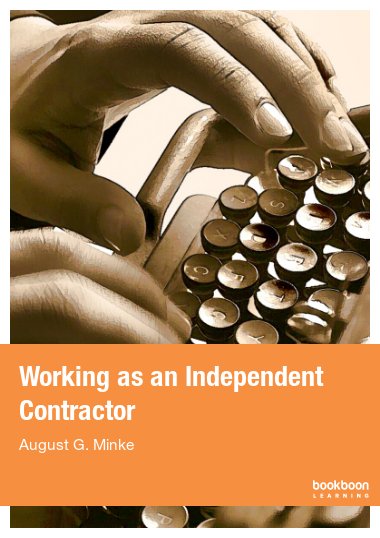There are many reasons why someone wants to be self-employed and be his own boss. Perhaps you see it as a primary or secondary source of income. You may want to pass your experience, information, craft or knowledge on to others. Some people aren’t in it for the money but merely wish to do good to others, or want to do something useful after retirement. Whatever your reason, your expertise or your drive, there will always be a demand for independent contractors.
An independent contractor can be a consultant providing services, a skilled craftsman, an artist, a developer or a designer, a manufacturer producing goods, etcetera. All offer different types of services. What they have in common is that they work for more than one client outside of an employer-employee relationship, and do so on their own behalf.
This book uses the term “independent contractor” for in essence that is what it is: an independent person to whom work is contracted out. As will be emphasised in this book, independence is key. It is the term that governs your tax status. Being a contractor also reflects that you are, in effect, not your own boss. You serve multiple clients, each with their own requirements, concerns, and demands. You do that on your own.
Organisations that hire independent contractors include businesses of all sizes, government institutions, individuals; in short anybody who has temporary or recurring needs but is not willing or able to hire regular employees for the purpose. Whatever a client’s reason is for outsourcing to an independent contractor, it always pays to know why you are hired.
Possessing the necessary skills to offer your product, whether it is a service or they are goods, is of course essential, but the continuity of your business requires far more than that. At some moment every project comes to an end, every order will be fulfilled. You need to actively pursue new projects and clients at all times. A successful independent contractor is equally good at selling his product, at effectively communicating with prospective and existing clients, and at maintaining a proper administration, as well as at his actual work. You must either possess some of these qualities yourself or hire others to perform the activities and duties for you. The latter allows you to free up direly needed time to focus on the aspects of the business at which you are good.
This book serves as a guideline to start and care for your business as an independent contractor.
The author is an active independent contractor with experience in all aspects of the trade. He has worked as a consultant and hired other contractors himself. Originally being trained as a lawyer the author also explains why it is important to have your paperwork in order and maintain a proper administration. In this book the author discusses all aspects of running your business independently and will help you find answers to questions such as how to generate and retain clients, how to plan ahead, set rates, be paid, and much more.

